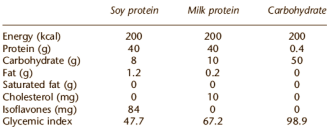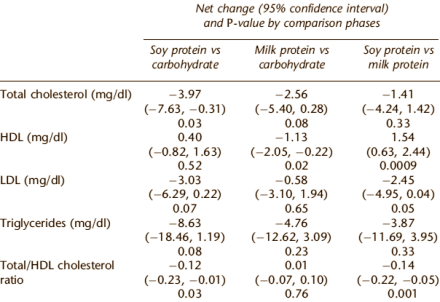|
Definition: "An ergogenic aid is any substance or phenomenon that enhances performance "
|
|
||||||||
19.04.2012 |
|
|
Soya protein better for cardiovascular health than dairy protein
A daily portion of 40 g soya protein improves your cholesterol level; the same amount of dairy protein has no effect, according to a study by nutritionists at Tulane University in the US, which will soon appear in the European Journal of Clinical Nutrition.
Many nutrition experts regard soya protein as inherently 'bad'. 'Soya plants don't want to be eaten,' they say. 'That's why they produce substances that are poisonous to us.' And usually they continue with a long list of suspected negative effects.
We don't actually understand the logic behind these anti-soya sentiments. It may well be the case that soya plants aren't so keen on being eaten up, but no doubt the same goes for cows, pigs and chickens. For that matter cows are probably not wildly happy that we take their milk away from them either. And why can't we find anything on these ghastly effects of soya in the literature. Where are all the men with soya breasts? Where's the definitive study that proves there's a relationship between soya and impotence?
Researchers at Tulane University in the US published in the European Journal of Clinical Nutrition the results of a study in which they closely examined one of these positive health effects. The Americans got 352 healthy adults to drink a glass of water with a sachet of powder dissolved in it, at breakfast and the evening meal, every day for eight weeks.
The researchers repeated the experiment three times. On one occasion the subjects consumed 40 g soya protein daily, on another occasion 40 g milk protein and on the last occasion carbohydrates of the same calorific value (90 percent maltodextrin, 5 percent sucrose and 5 percent fructose).
American and European food companies are allowed to promote soya products as 'cholesterol reducing'. According to this study they are justified in doing so. The soya supplement reduced the ratio of total cholesterol to HDL in comparison with the carbohydrate supplement. The milk protein supplement on the other hand caused small reduction in HDL. (HDL is 'good cholesterol'.) 'Bad cholesterol' or LDL increases the chance of a heart attack; HDL reduces the chance.
When the researchers compared the effects of soya and milk proteins they noticed that soya was better for the heart and blood vessels than milk protein. Above right you can see that compared to milk protein, soya protein resulted in more HDL, less LDL and a reduction in the ratio of total cholesterol to HDL.
So that's a point in favour of soya. Three points in fact.
The researchers used supplements from Solae, a soya producer. The research was funded however by the American government.
Source:
More:
|
|



